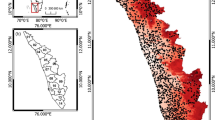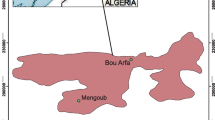Abstract
In this study, a new framework was developed for the estimation of groundwater recharge based on a hybrid method. In this regard, the homogeneous recharge zones were determined by the analytical hierarchy process (AHP). The recharge rates in these zones were calculated using the Thornthwaite and Mather’s method. These zones and their recharge rates were entered into the MODFLOW model. Next, the modeling processes, modification of recharge, and calibration of empirical models were interactively continued in the MODFLOW. This way, one of the most important disadvantages of conventional empirical models, i.e., ignoring the physical properties of the aquifer, was resolved by considering the main parameters such as soil properties, unsaturated thickness, land cover, irrigation, and precipitation in the resulting nonlinear equations. The low root mean square error values (less than 5.2) for all equations and high values of the coefficient of determinations indicated the accuracy and reliability of the models. The results of this hybrid method were a series of independent, cost-effective, rapid, and simple to use empirical equations for recharge estimation. As an example for the application of this method, the effects of climate change on groundwater recharge were evaluated in the study area. The obtained results showed that climate change would reduce the recharge rates of the homogeneous zones differently. Moreover, the recharge rate had a general decreasing trend in all regions. Overall, the total annual recharge rate would decrease in the plain. This reduction, especially in the west of the plain which is one of the most important sources of recharge supply, is considerable and will turn the entire plain vulnerable. In general, little reduction in rainfall or increase in temperature would have significant effects on groundwater recharge in the region. Therefore, due to the high dependence of this plain on groundwater resources, special planning is required for the exploitation of groundwater resources in the region.






Similar content being viewed by others
References
Ababei B, Sohrabi T (2009) Assessing the performance of SWAT model in Zayandeh Rud watershed. J Soil Water Conserv 16(3):41–58
Ali R, McFarlane D, Varma S, Dawes W, Emelyanova I, Hodgson G, Charles S (2012) Potential climate change impacts on groundwater resources of south-western Australia. J Hydrol 475:456–472
Allen DM, Cannon AJ, Toews MW, Scibek J (2010) Variability in simulated recharge using different GCMs. Water Resour Res 46:W00F03
Alley WM, Reilly TE, Franke OL (1999) Sustainability of Ground-Water Resources. U.S. Geological Survey Circular 1186
Barron OV, Crosbie RS, Charles SP et al (2011) Climate change impact on groundwater resources in Australia Waterlines report. National Water Commission, Canberra
Castaño S, Sanz D, Gómez AJJ (2013) Sensitivity of a groundwater flow model to both climatic variations and management scenarios in a semi-arid region of SE Spain. Water Resour Manag 27:2089–2101
Crosbie RS, McCallum JL, Walker GR, Chiew FHS (2012) Episodic recharge and climate change in the Murray-Darling basin, Australia. Hydrogeol J 20:245–261
Crosbie RS, Scanlon BR, Mpelasoka FS, Reedy RC, Gates JB, Zhang L (2013) Potential climate change effects on groundwater recharge in the High Plains Aquifer, USA. Water Resour Res: 49
Dams J, Salvadore E, Van Dael T, Ntegeka V, Willems P, Batelaan O (2011) Spatio-temporal impact of climate change on the groundwater system. Hydrol Earth Syst Sci Discuss 8:10195–10223
Dawes W, Ali R, Varma S, Emelyanova I, Hodgson G, McFarlane D (2012) Modelling the effects of climate and land cover change on groundwater recharge in south-west Western Australia. Hydrol Earth Syst Sci Discuss 9:6063–6099
Dourado ND, van Lier QJ, Metselaar K, Reichardt K, Nielsen RD (2010) General procedure to initialize the cyclic soil water balance by the Thornthwaite and Mather method. Sci Agric (Piracicaba, Braz) 67(1):87–95
Gohari A, Eslamian S, Abedi-Koupaei J, Massah Bavani A, Wang D, Madani K (2013) Climate change impacts on crop production in Iran’s Zayandeh-Rud River Basin. Sci Total Environ 442:405–419
Harbaugh AW (2005) MODFLOW-2005, the U.S. Geological Survey modular ground-water model - the ground-water flow process: U.S. Geological Survey Techniques and Methods 6-A16
Healy RW (2010) Estimating groundwater recharge. Cambridge University Press, Cambridge, p 245
Hetzel F, Vaessen V, Himmelsbach T, Struckmeier W, Villholth K (2008) Groundwater and Climate Change: Challenges and Possibilities. BMZ Groundwater Policy Paper, 15 S., BMZ Bonn
Jackson RC, Meister R, Prudhomme C (2011) Modelling the effects of climate change and its uncertainty on UK Chalk groundwater resources from an ensemble of global climate model projections. J Hydrol 399:12–28
Jiang Y, Liu C, Li X (2015) Hydrological impacts of climate change simulated by HIMS models in the Luanhe River Basin, North China. Water Resour Manag 29:1365–1384
Jyrkama MI, Sykes JF (2007) The impact of climate change on spatially varying groundwater recharge in the Grand River watershed (Ontario). J Hydrol 338(3–4):237–250
Kingston DG, Taylor RG (2010) Sources of uncertainty in climate change impacts on river discharge and groundwater in a headwater catchment of the Upper Nile Basin, Uganda. Hydrol Earth Syst Sci 14:1297–1308
Kumar CP (2012) Climate change and its impact on groundwater resources. Int J Eng Sci 1:43–60
Musekiwa C, Majola K (2013) Groundwater vulnerability Map for south africa. S Afr J Geomatics 2(2):152–163
Nyagwambo NL (2006) Groundwater Recharge Estimation and Water Resources Assessment in a Tropical Crystalline Basement Aquifer. Ph.d dissertation, in Delft University of Technology, Netherlands
Nyenje PM, Batelaan O (2009) Estimating the effects of climate change on groundwater recharge and baseflow in the upper Ssezibwa catchment, Uganda. Hydrol Sci J 54(4):713–726
Rushton KR (2003) Groundwater Hydrology: Conceptual and Computational Models. Wiley
Safavi HR, Bahreini GR (2009) Conjunctive simulation of surface water and groundwater resources under uncertaint. Iran J Sci Technol Trans B Eng 33:79–94
Satty T (1980) The Analytical Hierarchy Process, Planning Priority, Resource Allocation. TWS Publications. USA. pp 287
Scanlon BR, Healy RW, Cook PG (2002) Choosing appropriate techniques for quantifying groundwater recharge. Hydrogeol J 10:18–39
Thornthwaite CW, Mather Jr (1955) The Water Balance. Laboratory of Climatology, Centerton
Tirkey P, Gorai AK, Iqbal J (2013) AHP-GIS based DRASTIC model for groundwater vulnerability to pollution assessment: a case study of hazaribag district, Jharkhand, India. Int J Environ Prot 2:20–31
Toews MW, Allen DM (2009) Evaluating different GCMs for predicting spatial recharge in an irrigated arid region. J Hydrol 374:265–281
Woldeamlak ST, Batelaan O, Smedt F (2007) Effects of climate change on the groundwater system in the Grote-Nete catchment, Belgium. Hydrogeol J 15:891–901
Xie Z, Di Z, Luo Z, Qian MA (2012) A quasi-three-dimensional variably saturated groundwater flow model for climate modeling. J Hydrometeorol 13:27–46
Xu CY (2000) Modelling the effects of climate change on water resources in central Sweden. Water Resour Manag 14:177–189
Zagonari F (2010) Sustainable, just, equal, and optimal groundwater management strategies to cope with climate change: insights from Brazil. Water Resour Manag 24:3731–3756
Author information
Authors and Affiliations
Corresponding author
Rights and permissions
About this article
Cite this article
Goodarzi, M., Abedi-Koupai, J., Heidarpour, M. et al. Evaluation of the Effects of Climate Change on Groundwater Recharge Using a Hybrid Method. Water Resour Manage 30, 133–148 (2016). https://doi.org/10.1007/s11269-015-1150-4
Received:
Accepted:
Published:
Issue Date:
DOI: https://doi.org/10.1007/s11269-015-1150-4




